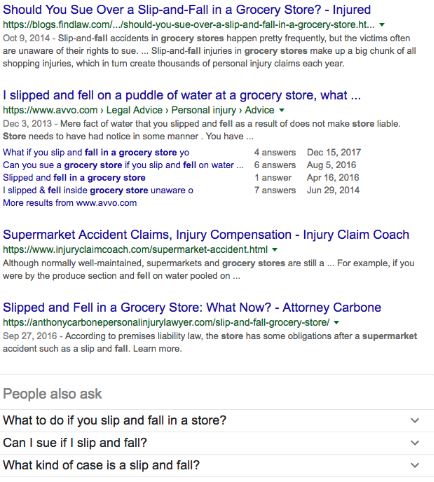Google “I fell in a grocery store.”
The first results that come up include advertisements for personal injury lawyers (claiming to get you the most money for the injury), admonishing stores and outlining possible avenues for finding them liable, and giving advice on how to sue.

We live in a litigious culture in which lawsuits can result in the award of millions in damages. As a store-owner, you can legally be held responsible for what goes on in and around your store. Not only that, mistakes regarding licensing, legal structures, tax and codes can also be costly to your business and reputation.
Gaining knowledge of common legal mistakes and situations that can lead to lawsuits will help you prevent those situations from arising. Preparation and understanding is key to protecting yourself and your customers from harm, legal disputes, financial loss and all of the attendant aggrevation.
Read on to learn more about common legal mistakes and how to avoid them:
Common legal mistakes
Here are some examples of common legal mistakes that can put your business at risk:
Improper business structure
According to the IRS, there are five common types of legal structure: sole proprietorship, partnerships, corporations, S corporations, and limited liability (LLC). These legal structures determine how much personal liability you have as a store-owner (which of your own assets could be exposed in the case of law suits, etc.). Read more about the options, pros, and cons of the various business structures here.
“Improper business structures” also refers to the selection of an incorrect structure which leads to the wrongful payment of taxes or failure to pay taxes at all. Small businesses are required to file annual income tax returns every year. Taxes can include payroll tax, self-employment tax, and excise tax. It can get confusing. Don’t get in trouble for not paying taxes correctly. Browse through the IRS’s guidelines to small business taxes and avoid making costly tax-paying mistakes. Read more about the tax outlook for small businesses for 2019 here.
Another structural mistake includes lack of written contracts and agreements among owners. You want to make sure contracts are thorough, documented, and signed. Set up a shareholders’ agreement if your store is owned by more than one person. This details the nature of you and your partners’ shared ownership and when documented, can come in handy if legal issues arise in the future.
Lack of proper insurance
Improper insurance or lack of insurance can leave you vulnerable or without recourse in the event of a legal battle. You need insurance to protect yourself against lawsuits, natural disasters, accidents and more.
You may also need to have workman’s compensation, which is a form of insurance for your employees. Workman’s comp requirements and conditions change according to state so browse this directory to find the laws applicable to your store’s location.
Get started by learning common insurance terms and the reasons why it is so important to be properly insured.
Negligence
Negligence is one of the most common reasons grocers face lawsuits. This includes personal injuries, slip and fall accidents, and parking lot accidents. As a store-owner, you assume premise liability which means you are legally responsible for personal injuries caused by obvious and neglected unsafe conditions within your store. If you are also a property owner, you may be legally responsible for parking lot incidents. Injured persons can also sue for pain and suffering, which greatly increases the amount in damages and can include mental suffering or emotional grievances.
Negligence suits or disputes may also center on the display of expired foods. Customers can report food poisoning and sue your store for selling spoiled or recalled foods. Injury claims like these can result in long, expensive, and time-consuming legal battles.
Faulty employee management
Liability may arise from faulty employee management. This may include lack of employee agreements, failing to pay on time or pay at all, inconsistent pay rate, and misclassifying of employees. Like your shareholders’ agreement, make sure you have the proper paperwork between you and your employees. Agreements should include pay rate, official job title, responsibilities, and expectations. In the case of a wrongful termination lawsuit, you want to have the proper documents that detail written agreements signed at the start of employment.
Pricing mistakes
These mistakes are relatively less serious than the ones detailed so far. However, price mistakes can lead to daily and consistent losses. This includes bait and switch tactics, mislabeled or inconsistent display prices, and inconsistent refund policies. The general rule is that a consumer cannot be asked to pay a higher price than what is displayed, even if the price is incorrect. Consumer protection laws protect against deceptive, or accidentally deceptive, business practices.
Tips and helpful resources to protect your business
Consistently practice safety procedures
Maintain a clean and safe store every day. There are different kinds of negligence when it comes to injury claims. Comparative negligence is when your negligence is weighed against the injured person’s negligence. The court then decides which party is more responsible. Contributory negligence takes into consideration how much the injured person contributed to the accident.
Make sure you tend to all obvious and obstructive unsafe conditions within your store in order to avoid accidents in the first place or to qualify for your own legal defense. This post details more about how to avoid personal injury lawsuits. Ensure frequent and thorough cleaning rotations. Train your employees on what to look out for an to mind the appearance and upkeep of the store (for example to pick up fallen grapes or tomatoes, wipe up drips and spills).
Invest in safety procedures
Invest in wet floor signs, “Do Not Enter” signs, cleaning equipment, store cameras, safety videos, and safety training for employees.
Repair damages as quickly as possible
Repair cracks, bumps, weak spots in flooring, faulty ceiling structures, precarious overhanging displays, and more. If you are a property owner, this includes repairing damages in the parking lot of your store too.
Tend to the elements
Bad weather happens. Make sure you’re prepared for rain and snow. Leaks can damage your store; major storms can cause electrical blow-outs and leave perishable foods to spoil; snow can create hazardous parking lot conditions. Make sure you have the proper insurance to face the elements. If you choose to open on snowy days, make sure you shovel away excess snow and lay down rock salts to prevent slips.
Get everything in writing
The right documents just might save your life in the event of a lawsuit. Document contracts, agreements, accounting information, taxes, and more. LegalZoom is a great resource to fill out legal forms without having to hire a lawyer.
Carefully manage your taxes
Filing taxes by hand can be extremely tedious and confusing. Online services like H&R Block and TurboTax simplify the process. Avoid costly tax mistakes by using online services or by getting the help of an accountant.
Digitize the workplace
Having a hard time keeping track of employee hours and payroll? Avoid missing payments with online services like ADP and Dayforce.
Correct pricing inconsistencies
Incorporate a POS system to keep track of prices. Some options include Square, Shopify, and Quickbooks. Online marketplaces like Mercato can give advice about the best POS systems as well as provide a place to sell your quality produce to a larger customer base online.
Avoid deceptive business practices
This includes making sure your online advertisements match your in-store prices. Avoid displaying incorrect prices on your website or social media pages. Read more about the important do’s and don’ts of interacting with your online customer base here.
Know food regulations well
Food safety is a must. Make sure perishable foods like produce, meat, and dairy are checked daily. Processed and packaged foods also have expiration dates so double-check those too. Browse the FDA guidelines for food safety regulations. This includes food handling, recalls, labeling, and packaging.
Consult a lawyer when necessary
If needed, search through services like RocketLawyer, LegalMatch, or LegalZoom to find the right attorney for you.
For more legal resources, refer to this helpful guide.








